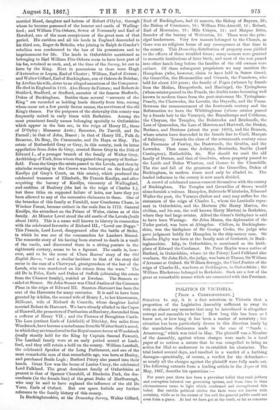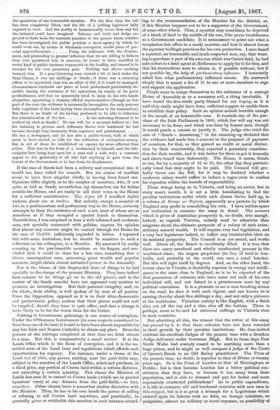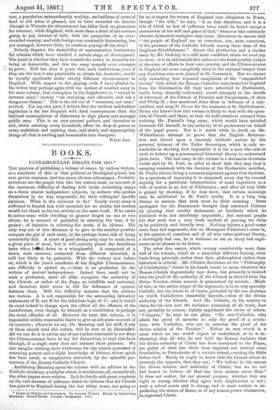POLITICS IN VICTORIA.
[ FROM A CORRESPONDENT. ] -
For years past there has been a prevalent belief that rank jobbery and corruption infested our governing system, and from time to time circumstances came to light which confirmed and strengthened this belief. But outside political circles the facts were not known with certainty, while as to the extent of the evil the general public could not even form a guess. At last we have got at the truth, so far as concerns
the operations of one honourable member. For the first time the veil has been completely lifted, and the life of a jobbing legislator fully exposed to view. And the reality is immeasurably worse than any but the initiated could have imagined. Scheme and trick and dodge are proved to have been the constant practice of the person whose conduct has been investigated, his public position a mere agency by which he could work out, by means of wholesale corruption, sordid plans of per-
sonal aggrandizement Using his influence with the Govern- ment, and pretending to greater influence than we are willing to believe they ever permitted him to exercise, he seems to have meddled in every kind of public business transacted in his locality, and turned it to account for his own pecuniary gain. Nothing was above—nothing beneath him. If a poor labouring man wanted a bit of land under the 42nd Clause, it was ten shillings to Sands ; if there was a returning officer to be appointed, that was an affair of 301., if it could be managed. Circumstances rendered one piece of local preferment particularly de- sirable during the currency of his operation; by reason of its great profitableness, and that he apparently tried to keep in his own hands altogether, appointing a dummy official representative (though on this part of the case the evidence is necessarily incomplete, the only persona fully cognizant of the facts having been accomplices in the transaction). But there is no doubt of his having professed to be able to influence
the administration of the law Is the Attorney-General to be worked by such as Sands ? No one will for a moment believe so ; but his claiming to possess such influence shows how hardened he had become through long immunity from exposure and punishment He has a newspaper, and he has also a public-house, both of which seem to have served as tolls for the collection of corruption-money. But in aid of these he established an agency far more efficient than either. This was in the form of a testimonial to himself, and the sub- scription lists being kept open for a year and a half, were a constant appeal to the generosity of all who had anything to gain from the favour of the Government or to fear from its displeasure.
If the case of Sands had been a solitary and exceptional one, it would not have called for remark. But his course of conduct seems to have been singular chiefly in having been found out. Opinions differ slightly as to the number of members, who, if not quite as bad as Sands, nevertheless lay themselves out for bribes outside the House, and are ready to sell their votes in the House for a sufficient consideration. The Argus (if I recollect right) reckons about ten or twelve. But nobody, except a member or two in a parliamentary and perfunctory way in the House, seriously attempts to deny the existence of such a set, most of whom are as notorious as if they occupied a special bench to themselves. Nevertheless, I was surprised to hear a well informed and moderate man, not specially connected with politics, express his opinion that almost any measure might be carried through the House for the sum of 15,0001. judiciously expended in bribes. I repeated this with some hesitation, lest he should be sensitive to such a reflection on his colleagues, to a Member. He answered by coolly counting up the purchaseable members on his fingers, and con- cluded that it could be done for a less sum, remarking that a clever, unscrupulous man, possessing great wealth and popular manners, might obtain almost unlimited power in the Assembly.
Nor is the blame of this disgraceful state of things to be laid specially to the charge of the present Ministry. They have indeed been content to let things go on in the old groove, and in the matter of the Sands scandal have not appeared very anxious to promote an investigation. But their personal integrity, and, on the whole, their ability, is well spoken of by men of all parties. Even the Opposition, opposed as it is to their ultra-democratic and protectionist policy, confess that their places could not well be supplied, should they have to quit office, and that a change is more likely to be for the worse than for the better.
Jobbing in Government patronage is one source of corruption. Under the O'Shanassy Government (in some respects considered to have been one of the best) it is said to have been almost impossible for any but Irish and Roman Catholics to obtain any place. Even the porters of the railways completed at that time are Irish almost to a man. But this is comparatively a small matter. It is the Lands Office which is the focus of corruption, and it is the un- settled state of the Land laws and regulations which affords such opportunities for roguery. For instance, under a clause of the Land Act of 1865, any person residing near the gold-fields may, subject to the sanction of the Lands Office, select and purchase, at a fixed price, any portion of Crown land within a certain distance, not exceeding a certain quantity. This clause the Minister of Lands has seen fit to extend to Crown lands (which are in general squatters' runs) at any distance from the gold-fields,—in fact, anywhere. Other clauses leave a somewhat similar discretion with the Minister. Thus, he has in his own hands the power of selling or refusing to sell Crown land anywhere, and practically, he generally gives or withholds this sanction in each instance accord- ing to the recommendation of the Member for the district, or, if this Member happens not to be a supporter of the Government, of some other who is. Thus, a squatter may sometimes be deprived of a block of land in the middle of his run, if he prove troublesome to a Government candidate. It is unnecessary to point out what a temptation this offers to a needy member, and how it almost forces the squatter to illegal practices for his own protection. I once heard a squatter, an honourable and much respected man, say, that want- ing to purchase a part of his own run which was Crown land, he had sent orders to a land agent at Melbourne to apply for it for him, and that his instructions were to obtain it, if possible without, but if not possible by, the help of parliamentary influence. I innocently asked him what parliamentary influence meant. He answered simply that it meant a fee of 51. to one or more members to urge and support the application.
People seem to resign themselves to the existence of a corrupt House of Assembly as to a necessary evil, a thing inevitable. I have heard the free-trade party blamed for not buying, as it is said they easily might have done, sufficient support to enable them to establish their policy. Such an opinion sounds horrible enough in the mouth of an honourable man. It reminds one of the pur- chase of the Irish Parliament in 1800, which few will say was not necessary to be done, and which was done by honest men, though it would puzzle a casuist to justify it. The judge who tried the case of " Sands v. Armstrong," in his summing-up declared that the evidence had made him a convert to the proposal of payment of members, for that, as they gained no credit or social distinc- tion by their membership, they expected a pecuniary considera- tion for their trouble, and it was better for them to get it honestly and above-board than dishonestly. The House, it seems, thinks so too, for by a majority of 22 to 10, the other day they patrioti- cally voted that they ought to be paid. The Council will pro- bably throw out the Bill, for it may be doubted whether a moderate salary would suffice to induce a rogue even to confine his rogueries within the bounds of respectability.
These things being so in Victoria, and being no secret, but in every man's mouth, it is not a little humiliating to find the peculiar institutions under which such abuses thrive held up, in a volume of Essays on Reform, apparently as a pattern by which England may profit in remodelling her own. ' I have neither space nor inclination to examine the essay in detail. The account which it gives of Australian prosperity is, no doubt, true enough. Indeed, as regards Victoria, nobody need be otherwise than sanguine about the ultimate prospects of a colony of such extra- ordinary natural wealth. It will require very bad legislation, and a very bad legislature indeed, to inflict any irretrievable blow on its material prosperity. The Council is as yet sound, and works well. Above all, the Bench is excellently filled. It is true that there are many unrefined and wholly uneducated persons in the wealthiest class ; the largest proprietor (in -fee) of land in Aus- tralia, and probably in the world, was once a retail butcher. But this will right itself by degrees. And, on the other hand, the lowest class in Victoria is decidedly superior in energy and intelli- gence to the same class in England, as is to be expected of the first generation of colonists who have come out each of his own individual will, and not forced in a promiscuous mass by any' political convulsion. It is a pleasure to see a man breaking stones on the road, he does it with such vigour, and one knows he is earning thereby about five shillings a day, and not only a pittance at the workhouse. Victorian society is like English, with a thick slice cut off the top and a thin slice off the bottom. There is perhaps; more to be said for universal suffrage in Victoria than in most countries.
But admitting all this, the utmost that the writer of this essay has proved by it is that these colonies have not been retarded in their growth by their peculiar institutions. He does indeed contrast the excellent Judges of the present time with a drunken Judge-Advocate under Governor Bligh. But in those days New South Wales had scarcely ceased to be anything more than a huge prison, and he might as well compare a judge of the Court of Queen's Bench to an Old Bailey practitioner. The Press of the present time, no doubt, is superior to that of fifteen or twenty years ago. So is the Press of London to that of Birmingham or Dublin ; but is that because London has a better political con- stitution than they have, or because it has many times their population, and is able to demand and pay for better and more expensively conducted publications? As to public expenditure, it is idle to compare old and burdened countries with new ones in this respect, but is it so great a triumph for a Legislature which entered upon its labours with no debt, no foreign ministers, no pauperism, almost no military or naval expenses, no possibility of war, a population extraordinarily wealthy, and millions of acres of land to sell when it pleased, not to have exceeded its income (though in Victoria the Government has fallen back on protection for revenue), while England, with more than a third of her revenue going to pay interest of debt, with the pauperism of an over- crowded country, and with foreign war constantly threatening, has yet managed, however little, to continue paying off her debt? Nobody disputes the desirability of representative institutions for colonies which have reached a certain stage of development. The point is whether they have worked the better in Australia for being so democratic, and this the essay scarcely even attempts S.' to prove. Still less does it prove that such institutions, even if they are the best it was practicable to obtain for Australia, would be equally applicable under utterly different circumstances in England. With respect to the glaring evils I have alluded to, the writer may perhaps agree with the author of another essay in the same volume, that corruption in the Legislature is, " except in extreme cases," merely " an annoying and offensive, and not a dangerous disease." This is the old cry of " measures, not men," revived. For my own part, I believe that the tardiest and feeblest legislation is far less frequent with fatal consequences than the habitual contemplation of dishonesty in high places and amongst public men. This is an ever present pattern and incentive to evil, which entering every household, offers its drop of poison to every ambitious and aspiring man, and slowly and imperceptibly brings all that is sterling and honourable into disrepute. WILD-Ass.
































 Previous page
Previous page